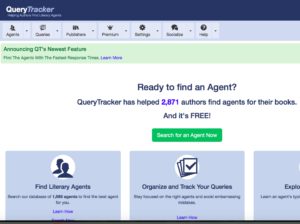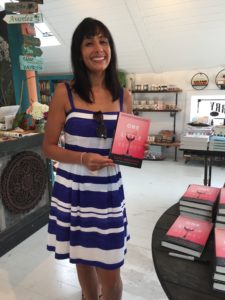
I spent the better part of last week saying things like, “My agent said….”
“My agent thinks…”
“My agent is waiting for my revisions…”
That’s right. That means the deal is done. I have a literary agent.
What’s more she is the agent I’ve always wanted. Or, at least, since I met her two years ago at the Algonkian Author-Mentor Novel Workshop in St. Augustine, Florida. She’s the first agent who heard about my novel; the first (and only) agent who critiqued my opening chapters, and the first agent who said she’d look at my full manuscript when it was completed.
She is Paula Munier, and she’s an agent with Talcott Notch Literary Services. After I met her at the Algonkian workshop with Michael Neff, the workshop director, I described them as “walking encyclopedias” because of their knowledge about the publishing industry, and specifically about commercial fiction. From the first day of that workshop, I got the impression that Paula had read virtually every bestseller published in the last 20 years. She knew the opening lines of the biggest bestsellers; she knew why they worked.
Grab Them By The First Page
 She told us if we didn’t grab readers in the first couple of pages, maybe even the first couple of paragraphs, our manuscripts would likely never be read by any agent, let alone by any publisher. She worked for four intense days with our 8-strong group on perfecting our pitches, and in the process delved and probed into the very souls of our protagonists and antagonists.
She told us if we didn’t grab readers in the first couple of pages, maybe even the first couple of paragraphs, our manuscripts would likely never be read by any agent, let alone by any publisher. She worked for four intense days with our 8-strong group on perfecting our pitches, and in the process delved and probed into the very souls of our protagonists and antagonists.
I found out Paula loves reading — anything and everything: from Lee Child to Shakespeare. She loves dogs and British TV, and is a former journalist, like myself. I liked her from the get-go. I knew I could trust her judgment.
Paula is also an author. She wrote two non-fiction, how-to guides on writing before she wrote her first novel. One of her how-to guides is titled The Writer’s Guide to Beginnings. In it she serves up an example of how to structure an opening chapter weaving in action, dialog and backstory. The example she used was something she wrote just for the book. But then, Gina Panietteri, her partner at Talcott Notch suggested Paula turn it into a full-length manuscript.
Edgar Awards Nominee
 And, so Paula did. A Borrowing of Bones is the first in a series featuring Mercy Carr, a retired, traumatized MP, newly returned from a tour of duty in Afghanistan, and her K-9, bomb-sniffing Belgian Shepherd, Elvis. The novel was published last year. This year, it was nominated for the Mary Higgins Clark Award in the 2019 Edgar Allan Poe Awards honoring the best in mystery fiction, non-fiction and television. She has just completed the second in the series, titled Blind Search which will be published in November.
And, so Paula did. A Borrowing of Bones is the first in a series featuring Mercy Carr, a retired, traumatized MP, newly returned from a tour of duty in Afghanistan, and her K-9, bomb-sniffing Belgian Shepherd, Elvis. The novel was published last year. This year, it was nominated for the Mary Higgins Clark Award in the 2019 Edgar Allan Poe Awards honoring the best in mystery fiction, non-fiction and television. She has just completed the second in the series, titled Blind Search which will be published in November.
As well as representing bestselling authors like Cate Holahan (pictured below) Paula is also an editor, and a writing instructor in workshops, online courses, and on conference panels. She travels to writer conferences all over the country. She is a founding and contributing editor on the website Career Authors, where she posts reguarly.
Writers Bootcamp
 Two months after returning from the Algonkian workshop, I signed up for the First Ten Pages Bootcamp — a Writers Digest online course offered by the agents at Talcott Notch. I blogged about it here and here. In that online course, Paula shredded my opening chapter as an “info dump.” The class included the opportunity to revise our first chapters and re-submit for a second look by the agents of Talcott Notch with the possibility we’d be invited to submit the full manuscript.
Two months after returning from the Algonkian workshop, I signed up for the First Ten Pages Bootcamp — a Writers Digest online course offered by the agents at Talcott Notch. I blogged about it here and here. In that online course, Paula shredded my opening chapter as an “info dump.” The class included the opportunity to revise our first chapters and re-submit for a second look by the agents of Talcott Notch with the possibility we’d be invited to submit the full manuscript.
I knew I’d info dumped because I was still really writing to inform myself about my characters and plot. As I wrote back then, I woke the morning after emailing my opening chapters, thinking: “Crap! I’ve turned in crap!”
A Big Deal
So, when the inevitable “shredding” happened, I emailed Paula to say I wouldn’t be re-writing just yet, and wouldn’t return to my opening chapters until after I finished my first draft. I added that I planned to “query” her when my manuscript was revised and ready to go.
Paula emailed back: “I look forward to seeing the manuscript when it’s finished.”
Yesssss! I did my happy dance. I’d gotten a “request” for my full manuscript — without going through the dreaded query process. I knew that in that nether world where authors search for agents, that was a pretty big deal.
About 18 months later, after several drafts, after editing by a professional editor, after some more revisions, I emailed my manuscript to Paula. And, then I sat back and waited.
Well, actually no. I did not sit back.
Plan B
 At least not for very long. Almost immediately, I started drawing up a list of agents to query if Paula decided she hated my manuscript — and declined to represent me. I did not want to curl up in a small ball to die if that happened.
At least not for very long. Almost immediately, I started drawing up a list of agents to query if Paula decided she hated my manuscript — and declined to represent me. I did not want to curl up in a small ball to die if that happened.
Next week, I will write in more detail on how I chose the agents on my list, what resources were the most helpful, how long agents took to reply; how many agents asked for the full manuscript, what I learned about the process — and the really surprising reaction of two agents when I finally got my offer of representation from Paula.
For the moment, however, I will just add that several months passed after I emailed my manuscript to Paula and before I contacted agents on my list. But like a true author, as weeks passed, I imagined the worst possible scenarios: Paula had read the manuscript and hated it; she’d reached a really boring part, had stopped reading the manuscript, and couldn’t bring herself to pick it up again; she had decided not to take on any more clients, and I had missed the boat.
I started sending out my query letters and decided to face the worst, and email Paula to ask where she had stopped reading; at which point of my manuscript had she given up on me?
Two Sittings

As it turned out, my manuscript was still in Paula’s “reading queue.” I didn’t know at the time that three or four months isn’t that long for an agent to keep a full manuscript in their “reading queue. “– One agent actually sent me an auto response stating that an average response time for simple queries (never mind a full ms.) is 12 weeks!
Once she started reading, however, Paula finished it in two sittings. She emailed the same day, said she’d made notes; told me she thought I could improve the chances of getting it published by making some changes — and, if I was willing to make the changes, she would discuss representation with me.
Was I willing to make the changes? You bet. So, yes, I’m in the middle of making changes now. I much prefer writing, revising, re-writing my novel to writing query letters. Hopefully, I’ll never have to write another query letter in my lifetime.
And, yes, signing with a literary agent feels like a big achievement, and a validation because someone in the business of getting novels published has read my manuscript and likes it, and sees its potential. But I know it’s only a respite in the hard slog towards publication. It’s not the destination.
It sure helps, however, to know you’ve saddled up with a partner who’s got your back for the rest of the journey.
Please click on the Like button if you enjoyed this blog or found it helpful.
Congrats Joanna!! Knew you would land an agent 🙂
Thank you for your vote of confidence, Eldon.
How exciting!
It’s been quite a journey so far, Sandra. And, yes, exciting does describe it mostly.
What a wonderful piece. This is so inspirational and informative. Just knowing this is possible gives hope to other writers and emphasizes the importance of not giving up. I am so happy for you.
I’m happy you think it’s inspirational and informative, Greg. My aim this week and next is to share as much as I can to make these blogs a useful read.
Congratulations! I’m so happy for you. I can only hope (when I finally finish my novel) that the process will turn out as well for me! xo
I hope so, too.